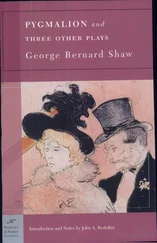Gilbert Chesterton - George Bernard Shaw
Здесь есть возможность читать онлайн «Gilbert Chesterton - George Bernard Shaw» — ознакомительный отрывок электронной книги совершенно бесплатно, а после прочтения отрывка купить полную версию. В некоторых случаях можно слушать аудио, скачать через торрент в формате fb2 и присутствует краткое содержание. Жанр: foreign_antique, foreign_prose, на английском языке. Описание произведения, (предисловие) а так же отзывы посетителей доступны на портале библиотеки ЛибКат.
- Название:George Bernard Shaw
- Автор:
- Жанр:
- Год:неизвестен
- ISBN:нет данных
- Рейтинг книги:5 / 5. Голосов: 1
-
Избранное:Добавить в избранное
- Отзывы:
-
Ваша оценка:
- 100
- 1
- 2
- 3
- 4
- 5
George Bernard Shaw: краткое содержание, описание и аннотация
Предлагаем к чтению аннотацию, описание, краткое содержание или предисловие (зависит от того, что написал сам автор книги «George Bernard Shaw»). Если вы не нашли необходимую информацию о книге — напишите в комментариях, мы постараемся отыскать её.
George Bernard Shaw — читать онлайн ознакомительный отрывок
Ниже представлен текст книги, разбитый по страницам. Система сохранения места последней прочитанной страницы, позволяет с удобством читать онлайн бесплатно книгу «George Bernard Shaw», без необходимости каждый раз заново искать на чём Вы остановились. Поставьте закладку, и сможете в любой момент перейти на страницу, на которой закончили чтение.
Интервал:
Закладка:
But while Bernard Shaw pleasantly surprised innumerable cranks and revolutionists by finding quite rational arguments for them, he surprised them unpleasantly also by discovering something else. He discovered a turn of argument or trick of thought which has ever since been the plague of their lives, and given him in all assemblies of their kind, in the Fabian Society or in the whole Socialist movement, a fantastic but most formidable domination. This method may be approximately defined as that of revolutionising the revolutionists by turning their rationalism against their remaining sentimentalism. But definition leaves the matter dark unless we give one or two examples. Thus Bernard Shaw threw himself as thoroughly as any New Woman into the cause of the emancipation of women. But while the New Woman praised woman as a prophetess, the new man took the opportunity to curse her and kick her as a comrade. For the others sex equality meant the emancipation of women, which allowed them to be equal to men. For Shaw it mainly meant the emancipation of men, which allowed them to be rude to women. Indeed, almost every one of Bernard Shaw's earlier plays might be called an argument between a man and a woman, in which the woman is thumped and thrashed and outwitted until she admits that she is the equal of her conqueror. This is the first case of the Shavian trick of turning on the romantic rationalists with their own rationalism. He said in substance, "If we are democrats, let us have votes for women; but if we are democrats, why on earth should we have respect for women?" I take one other example out of many. Bernard Shaw was thrown early into what may be called the cosmopolitan club of revolution. The Socialists of the S.D.F. call it "L'Internationale," but the club covers more than Socialists. It covers many who consider themselves the champions of oppressed nationalities – Poland, Finland, and even Ireland; and thus a strong nationalist tendency exists in the revolutionary movement. Against this nationalist tendency Shaw set himself with sudden violence. If the flag of England was a piece of piratical humbug, was not the flag of Poland a piece of piratical humbug too? If we hated the jingoism of the existing armies and frontiers, why should we bring into existence new jingo armies and new jingo frontiers? All the other revolutionists fell in instinctively with Home Rule for Ireland. Shaw urged, in effect, that Home Rule was as bad as Home Influences and Home Cooking, and all the other degrading domesticities that began with the word "Home." His ultimate support of the South African war was largely created by his irritation against the other revolutionists for favouring a nationalist resistance. The ordinary Imperialists objected to Pro-Boers because they were anti-patriots. Bernard Shaw objected to Pro-Boers because they were pro-patriots.
But among these surprise attacks of G. B. S., these turnings of scepticism against the sceptics, there was one which has figured largely in his life; the most amusing and perhaps the most salutary of all these reactions. The "progressive" world being in revolt against religion had naturally felt itself allied to science; and against the authority of priests it would perpetually hurl the authority of scientific men. Shaw gazed for a few moments at this new authority, the veiled god of Huxley and Tyndall, and then with the greatest placidity and precision kicked it in the stomach. He declared to the astounded progressives around him that physical science was a mystical fake like sacerdotalism; that scientists, like priests, spoke with authority because they could not speak with proof or reason; that the very wonders of science were mostly lies, like the wonders of religion. "When astronomers tell me," he says somewhere, "that a star is so far off that its light takes a thousand years to reach us, the magnitude of the lie seems to me inartistic." The paralysing impudence of such remarks left everyone quite breathless; and even to this day this particular part of Shaw's satiric war has been far less followed up than it deserves. For there was present in it an element very marked in Shaw's controversies; I mean that his apparent exaggerations are generally much better backed up by knowledge than would appear from their nature. He can lure his enemy on with fantasies and then overwhelm him with facts. Thus the man of science, when he read some wild passage in which Shaw compared Huxley to a tribal soothsayer grubbing in the entrails of animals, supposed the writer to be a mere fantastic whom science could crush with one finger. He would therefore engage in a controversy with Shaw about (let us say) vivisection, and discover to his horror that Shaw really knew a great deal about the subject, and could pelt him with expert witnesses and hospital reports. Among the many singular contradictions in a singular character, there is none more interesting than this combination of exactitude and industry in the detail of opinions with audacity and a certain wildness in their outline.
This great game of catching revolutionists napping, of catching the unconventional people in conventional poses, of outmarching and outmanœuvring progressives till they felt like conservatives, of undermining the mines of Nihilists till they felt like the House of Lords, this great game of dishing the anarchists continued for some time to be his most effective business. It would be untrue to say that he was a cynic; he was never a cynic, for that implies a certain corrupt fatigue about human affairs, whereas he was vibrating with virtue and energy. Nor would it be fair to call him even a sceptic, for that implies a dogma of hopelessness and definite belief in unbelief. But it would be strictly just to describe him at this time, at any rate, as a merely destructive person. He was one whose main business was, in his own view, the pricking of illusions, the stripping away of disguises, and even the destruction of ideals. He was a sort of anti-confectioner whose whole business it was to take the gilt off the gingerbread.
Конец ознакомительного фрагмента.
Текст предоставлен ООО «ЛитРес».
Прочитайте эту книгу целиком, купив полную легальную версию на ЛитРес.
Безопасно оплатить книгу можно банковской картой Visa, MasterCard, Maestro, со счета мобильного телефона, с платежного терминала, в салоне МТС или Связной, через PayPal, WebMoney, Яндекс.Деньги, QIWI Кошелек, бонусными картами или другим удобным Вам способом.
Интервал:
Закладка:
Похожие книги на «George Bernard Shaw»
Представляем Вашему вниманию похожие книги на «George Bernard Shaw» списком для выбора. Мы отобрали схожую по названию и смыслу литературу в надежде предоставить читателям больше вариантов отыскать новые, интересные, ещё непрочитанные произведения.
Обсуждение, отзывы о книге «George Bernard Shaw» и просто собственные мнения читателей. Оставьте ваши комментарии, напишите, что Вы думаете о произведении, его смысле или главных героях. Укажите что конкретно понравилось, а что нет, и почему Вы так считаете.










